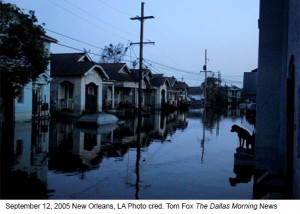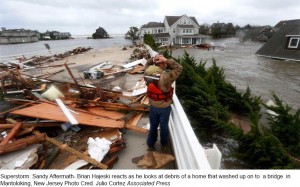
“Increasing temperatures, decreasing water availability, more intense storm events, and sea level rise will each independently, and in some cases in combination, affect the ability of the United States to produce and transmit electricity from fossil, nuclear, and existing and emerging renewable energy sources… Quantifying the impacts of climate change on the nation’s energy infrastructure is increasingly important to improve understanding of the social and economic costs and benefits of resilience measures and response strategies… Ultimately, climate change adaptation and mitigation actions are complementary approaches that can jointly reduce the costs and risks of climate change and extreme weather. Effective adaptation strategies and the development and deployment of climate-resilient energy technologies will facilitate resilient energy systems in the United States and around the globe.”
– US Energy Sector Vulnerabilities to Climate Change and Extreme Weather, US Department of Energy, July 2013, DOE/PI-0013
 International researchers, scholars and distinguished institutions are documenting climate change. Studies predict change-inducing shifts and extreme weather and atmospheric events including flooding, higher temperatures and sea levels, more precipitation, droughts, heat waves and storm surges. Due to significant vulnerabilities in social, economic, biological (e.g., health) and physical coping capacities, these consequences are predicted to result in disproportionate impacts in disadvantaged communities of color, low wealth communities and among the elderly, women, children and other sensitive groups. Effective efforts to address climate change will couple community engagement, readiness, and adequate support resources with climate adaptation, mitigation, externalizing the cost of carbon and reduction in greenhouse gases and co-pollutants.
International researchers, scholars and distinguished institutions are documenting climate change. Studies predict change-inducing shifts and extreme weather and atmospheric events including flooding, higher temperatures and sea levels, more precipitation, droughts, heat waves and storm surges. Due to significant vulnerabilities in social, economic, biological (e.g., health) and physical coping capacities, these consequences are predicted to result in disproportionate impacts in disadvantaged communities of color, low wealth communities and among the elderly, women, children and other sensitive groups. Effective efforts to address climate change will couple community engagement, readiness, and adequate support resources with climate adaptation, mitigation, externalizing the cost of carbon and reduction in greenhouse gases and co-pollutants.
Additional Resources:
Climate Change: The Public Health Response
African Americans & Climate Report
A Climate of Change African Americans, Global Warming, and Just Climate Policy for the US
The Impact of Climate Change on Minorities and Indigenous Peoples
Environmental Health Perspectives
| S | M | T | W | T | F | S |
|---|---|---|---|---|---|---|
| « Jul | ||||||
| 1 | ||||||
| 2 | 3 | 4 | 5 | 6 | 7 | 8 |
| 9 | 10 | 11 | 12 | 13 | 14 | 15 |
| 16 | 17 | 18 | 19 | 20 | 21 | 22 |
| 23 | 24 | 25 | 26 | 27 | 28 | 29 |
| 30 | ||||||
NEW YORK—Today, the National Audubon Society announced the appointment of Deeohn Ferris, J.D., as vice president for equity, diversity and inclusion at the venerable conservation organization. Ferris is a pioneer in the environmental justice field, with extensive experience in law and policy. She has worked on community regeneration with federal agencies, governments, foundations, communities of color, low income, and tribal and indigenous organizations in the United States and countries on five continents.
“My definition of equity is community building and inclusive community engagement in planning, decisions and investments that broaden pathways and access to environmental benefits and opportunities,” said Ferris. “I am thrilled to contribute to the work that Audubon is doing to build a more equitable and inclusive conservation movement and to make strides together to strengthen and build on this progress. Every community is entitled to a healthy environment, to the beneficial effects of birds and nature, and the ability to impact decisions about their lives and places.”
“Equity, diversity and inclusion are core values and strategic imperatives for Audubon, and Deeohn Ferris brings a truly formidable set of skills, accomplishments, and relationships,” said Audubon President and CEO David Yarnold. “What we do is what matters, and Deeohn’s decades of work at the intersection of equality and environmental issues makes her a natural fit to lead Audubon’s efforts. She is a doer with a remarkable track record of success in broadening equity and inclusion.”
Ferris comes to Audubon from her position as president and founder of Sustainable Community Development Group, a not-for-profit national research and public-policy social venture enterprise. She has been a thought leader for equity and inclusion throughout her career, fostering collaboration among diverse stakeholders and across interdisciplinary sectors. Ferris began her career at the U.S. Environmental Protection Agency. She served as counsel to the American Insurance Association and was the first African-American senior policy office director at the National Wildlife Federation. After that, she launched the Environmental Justice Project for the Lawyers’ Committee for Civil Rights Under Law.
Ferris is recognized for her success in building complex coalitions with a wide variety of community, governmental, nonprofit, philanthropic and private sector leaders. She has over 20 years of expertise in groundbreaking environmental advocacy, rooted in her leadership of the landmark national campaign that resulted in the federal Presidential Environmental Justice Executive Order 12898. Ferris capitalized on this momentum by establishing the Washington Office on Environmental Justice representing hundreds of communities and faith leaders in the United Nations, Congress and other legislative bodies.
Ferris will lead equity, diversity and inclusion initiatives across Audubon’s 700-person staff, board of directors, 1.1 million members, 463 local chapters and more than 60 local and regional advisory boards.
Audubon’s statement on equity, diversity, and inclusion reads in part:
“Just as biodiversity strengthens natural systems, the diversity of human experience strengthens our conservation efforts for the benefit of nature and all human beings. Audubon must represent and reflect that human diversity, embracing it in all the communities where we work, in order to achieve our conservation goals. To that end, we are committed to increasing the diversity of our staff, board, volunteers, members and supporters, and to fostering an inclusive network of Audubon centers and chapters in all kinds of communities, from rural to urban.”
Ferris will join Audubon August 1, 2017, and will be based in Washington, D.C., reporting to Chief Network Officer David J. Ringer.
The National Audubon Society protects birds and the places they need, today and tomorrow, throughout the Americas using science, advocacy, education and on-the-ground conservation. Audubon’s state programs, nature centers, chapters and partners have an unparalleled wingspan that reaches millions of people each year to inform, inspire and unite diverse communities in conservation action. Since 1905, Audubon’s vision has been a world in which people and wildlife thrive. Audubon is a nonprofit conservation organization. Learn more and how to help at www.audubon.org and follow us on Twitter and Instagram at @audubonsociety.
###
Contact: Nicolas Gonzalez, ngonzalez@audubon.org, 212-979-3068.
